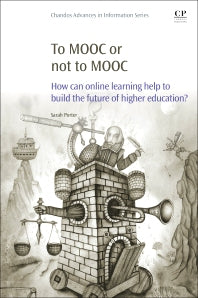Freshly Printed - allow 10 days lead
Couldn't load pickup availability
To MOOC or Not to MOOC
How Can Online Learning Help to Build the Future of Higher Education?
Focuses upon six institutions and tells the story of their engagement with Massive Open Online Courses, or MOOCs
Sarah Porter (Author)
9780081000489, Elsevier Science
Paperback / softback, published 11 May 2015
156 pages
22.9 x 15.1 x 1.1 cm, 0.24 kg
Scarcely a week goes by without coverage in the UK and international media about the latest MOOC revelation. Despite some significant initiatives in the dotcom era, online learning has somehow never delivered on its promise to revolutionize education. To MOOC or not to MOOC explores the history of MOOCs and analyses the current MOOC context by describing six institutions and the story of their engagement with MOOCs. Looking at each of the different type of institution in turn, it analyses the processes behind their decision to engage with online learning and MOOCs, how the MOOC project is managed and led, and discusses issues such as quality assurance, governance and partnerships. Chapters draw together and analyse the data and draw out advice for institutions, to help them make choices about how to respond to MOOCs and other high-impact changes in digital education. The book contains checklists and planning tools to support strategy and planning, and concludes with a future look at MOOCs exploring some of the possible trends that may impact upon higher education, such as business models, data and analytics, learning design and competitors in the MOOC marketplace.
Subject Areas: Databases & the Web [UNN], Internet: general works [UBW], Educational equipment & technology, computer-aided learning [CAL JNV], Open learning, home learning, distance education [JNQ], Higher & further education, tertiary education [JNM], Education [JN]


